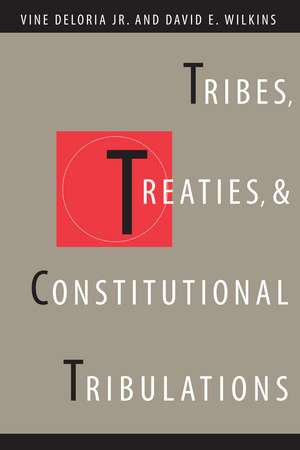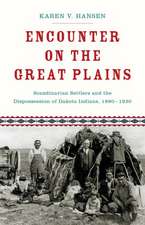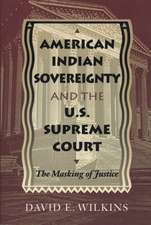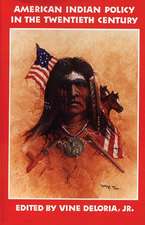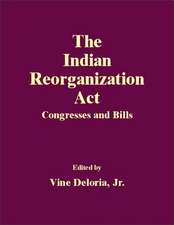Tribes, Treaties, and Constitutional Tribulations
Autor Vine Deloria, Jr., David E. Wilkinsen Limba Engleză Paperback – 2000
In this book, two prominent scholars of American Indian law and politics undertake a full historical examination of the relationship between Indians and the United States Constitution that explains the present state of confusion and inconsistent application in U.S. Indian law. The authors examine all sections of the Constitution that explicitly and implicitly apply to Indians and discuss how they have been interpreted and applied from the early republic up to the present. They convincingly argue that the Constitution does not provide any legal rights for American Indians and that the treaty-making process should govern relations between Indian nations and the federal government.
Preț: 197.75 lei
Nou
Puncte Express: 297
Preț estimativ în valută:
37.84€ • 40.46$ • 31.55£
37.84€ • 40.46$ • 31.55£
Carte tipărită la comandă
Livrare economică 17 aprilie-01 mai
Preluare comenzi: 021 569.72.76
Specificații
ISBN-13: 9780292716087
ISBN-10: 0292716087
Pagini: 221
Dimensiuni: 152 x 229 x 13 mm
Greutate: 0.31 kg
Ediția:New.
Editura: University of Texas Press
Colecția University of Texas Press
ISBN-10: 0292716087
Pagini: 221
Dimensiuni: 152 x 229 x 13 mm
Greutate: 0.31 kg
Ediția:New.
Editura: University of Texas Press
Colecția University of Texas Press
Notă biografică
Vine Deloria, Jr. (1933–2005), a Standing Rock Sioux, was active in Indian legal and political affairs for several decades. David E. Wilkins, a Lumbee, is Associate Professor of American Indian Studies and Political Science at the University of Minnesota.
Cuprins
- Introduction
- Chapter I. Europeans and the New World
- Chapter II. The Articles of Confederation
- Chapter III. The Constitution and American Indian Tribes
- The Federalist Papers
- Explicit Clauses Dealing with Indians
- Implicit Clauses Dealing with Indians
- Chapter IV. The Relationship of Indian Tribes to the Three Branches of the Federal Government
- Indians and the Executive Branch
- Indians and the Legislative Branch
- Indians and the Judicial Branch
- Chapter V. The Historical Development of Constitutional Clauses
- The Treaty-making Power
- The Power to Regulate Commerce
- The Property Clause
- Miscellaneous Constitutional Clauses
- Chapter VI. The Constitutional Amendments
- The Bill of Rights
- The First Amendment: The Establishment of Religion
- The First Amendment: The Free Exercise Clause
- The Lyng Decision
- The Smith Decision
- The First Amendment: Freedoms of Speech and Assembly
- The Fourth Amendment: Search and Seizure
- The Fifth Amendment: Double Jeopardy
- The Fifth Amendment: Due Process
- The Fifth Amendment: Just Compensation
- The Sixth Amendment: Legal Counsel
- Chapter VII. The Later Constitutional Amendments
- The Thirteenth Amendment
- The Fourteenth Amendment: Citizenship and Due Process
- The Fifteenth Amendment
- The Sixteenth Amendment
- The Prohibition Amendments
- The Twenty-sixth Amendment
- Chapter VIII. The Status of Indian Tribes and the Constitution
- Notes
- References
- Index of Cases
- General Index
Descriere
Two prominent scholars of American Indian law and politics undertake a full historical examination of the relationship between Indians and the United States Constitution that explains the present state of confusion and inconsistent application in U.S. Ind
